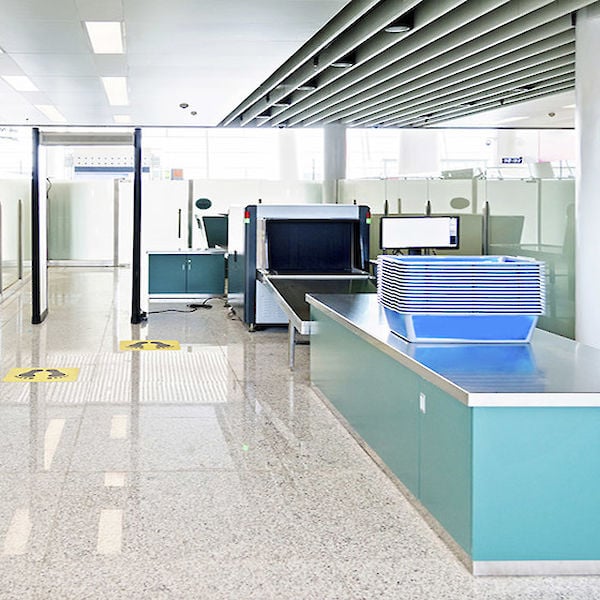2017 Holiday Travel Report: Most Stressful U.S. Airports
Last updated on 03/28/2023
WARWICK, R.I., Dec. 19, 2017 -- In an effort to help empower travelers to make more informed decisions when it comes to holiday travel plans, InsureMyTrip Research reveals which airports to possibly avoid and how the latest data trends can aid travelers when comparing travel insurance benefits.
Summary:
- For the first time in five years, Hartsfield-Jackson Atlanta International (ATL) is reporting more flight cancellations than Chicago O'Hare International (ORD) and this doesn't even include the power outage cancellations from this week.
- Weather is the top reason for flight cancellations and delays nationwide.
- If a flight is canceled, most airlines will rebook travelers on next available flight at no additional charge. However, airlines are not required to reimburse travelers for losses incurred as a result of a canceled flight.
InsureMyTrip Research predicts these airports will be more stressful for travelers this holiday due to the likelihood of canceled flights based on previously reported data for this year.
| Rank | Airport | City | Flight Cancellations |
|---|---|---|---|
| 1 | ATL | Atlanta | 3,918* |
| 2 | ORD | Chicago | 3,505 |
| 3 | IAH | Houston | 3,481 |
| 4 | SFO | San Francisco | 3,057 |
| 5 | LGA | New York | 2,886 |
| 6 | EWR | Newark | 2,875 |
| 7 | BOS | Boston | 2,541 |
| 8 | MCO | Orlando | 2,510 |
| 9 | FLL | Fort Lauderdale | 2,371 |
| 10 | JFK | New York | 2,047 |
| 11 | LAX | Los Angeles | 1,946 |
| 12 | DFW | Dallas/Fort Worth | 1,783 |
| 13 | HOU | Houston | 1,723 |
| 14 | MIA | Miami | 1,695 |
| 15 | BWI | Baltimore | 1,614 |
| 16 | DCA | Washington DC | 1,407 |
| 17 | DEN | Denver | 1,388 |
| 18 | LAS | Las Vegas | 1,277 |
| 19 | TPA | Tampa | 1,274 |
| 20 | CLT | Charlotte | 1,220 |
Methodology: This table contains data for non-stop domestic flights by major air carriers collected in 2017 thus far by the Bureau of Transportation Statistics. *Data excludes over 1,000 canceled flights due to the power outage of December, 17th 2017 at Hartsfield-Jackson International. Those numbers have not been collected yet.
Top reasons given for a flight cancellation in 2017 by all reportable U.S. airports:
| Reason for Cancellation | Number of Flights Affected |
|---|---|
| Weather | 45,008 |
| Air Carrier | 16,928 |
| National Aviation System | 13,725 |
| Security | 290 |
Flight data obtained by the Bureau of Transportation Statistics. National Aviation System cancellations can also be due to weather.
Flight Cancellation Policies
Flight cancellation policies vary by airline and circumstance. When an airline cancels a flight, most will try to rebook passengers on the next available flight.
Airlines are also not required to reimburse travelers for losses incurred as a result of a canceled flight, such as prepaid, non-refundable:
- Hotel room
- All-inclusive vacation or resort
- A cruise
- A tour or safari
- Concert or entertainment tickets
Travelers concerned about protecting any trip expenses should buy travel insurance.
Dealing with Flight Delays
Each airline has its own flight delay policy for passengers waiting at the airport; there are no federal requirements.
Travelers concerned about delays should be aware of the following:
- Generally, early departures are less likely to be delayed.
- Book a non-stop flight (no stops).
- When booking, ask the airline about the on-time performance percentage for an individual flight.
- Closer to departure, check real-time airport data. This will provide timely information on weather concerns or air traffic delays.
- Be aware of "creeping delays." When an airline continues to push back a departure time it can sometimes be extended for hours or lead to a cancellation.
- If a flight is delayed, try to learn the reason why to better gauge if the flight is in jeopardy of being canceled. Reasons for delays may include maintenance, fueling, crew issues, weather, previous flight with same aircraft arrived late, causing the present flight to depart late, or security issues.
- Some flights will be delayed on the tarmac before or after take-off. As a general rule, DOT prohibits flights to remain on the tarmac for more than three hours.
Passengers with departing flights at busier airports should consider travel insurance for travel delay protection. "If travelers are made aware of the possibility of flight delays, they can then use that data to help them compare travel delay benefits during a travel insurance purchase," says InsureMyTrip Intelligence Analyst Danny DeMello.
Travel delay benefits vary with each travel insurance provider, generally between a 5 and 24-hour window. The benefit is designed to provide reimbursement for reasonable meals and accommodations while unable to travel.
Tip: Travelers must be delayed for a certain number of hours before this benefit can be applied. When comparing travel insurance, look for the minimum delay time (typically, starting at 5 hours) to start qualifying for coverage as soon as possible.
Contact:
[email protected]
About InsureMyTrip
It's simple. InsureMyTrip finds you the right travel insurance plan, every time. InsureMyTrip is the authority on travel insurance. We are committed to empowering travelers to make the best possible insurance decisions by leveraging our technology, data intelligence, and expertise.
SOURCE InsureMyTrip


